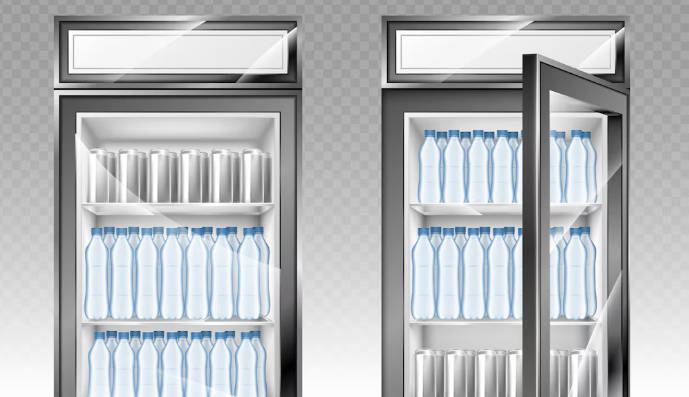In the food service industry, preserving food quality and ensuring safety are paramount. A fundamental component of these objectives is reliable and well-maintained refrigeration equipment. Proper refrigeration plays a critical role in keeping ingredients fresh, maintaining optimal taste, and preventing harmful bacterial growth. In this article, we’ll explore the ways refrigeration impacts food quality and safety and why investing in the right refrigeration equipment is essential for any food business.
1. Preserving Food Freshness
Freshness is one of the most important aspects of food quality, affecting taste, texture, and nutritional value. The quality of perishable foods like meats, dairy, fruits, and vegetables can deteriorate quickly if not stored under the correct conditions. Refrigeration equipment keeps these items at a stable, low temperature, slowing down natural spoilage processes and preventing premature decay.
Cold temperatures reduce the activity of enzymes responsible for ripening, helping fruits and vegetables maintain their freshness longer. For dairy and meat products, refrigeration prevents the growth of spoilage organisms, extending their usable life and preserving their flavors. By maintaining consistent temperatures, refrigeration units play a crucial role in keeping food fresher for longer, thus enhancing its quality for customers.
2. Preventing Bacterial Growth
One of the most significant impacts of proper refrigeration is its ability to inhibit bacterial growth. Harmful bacteria such as Salmonella, Listeria, and E. coli can thrive at temperatures above 40°F (4°C). By keeping food at or below this temperature, refrigeration equipment helps prevent these bacteria from multiplying and causing foodborne illnesses.
For commercial kitchens, where large quantities of food are handled daily, preventing bacterial contamination is essential for food safety. Food safety standards recommend keeping high-risk foods, such as raw meats and dairy products, at specific cold temperatures to avoid bacterial growth. Effective refrigeration not only keeps food safe for consumption but also protects customers from potential health risks, ensuring that businesses comply with strict health and safety standards.
3. Maintaining Nutritional Value
The nutritional content of food can also degrade when exposed to fluctuating or improper temperatures. Vitamins and antioxidants are particularly sensitive to temperature changes and can lose their potency when foods aren’t stored correctly. For example, vitamin C, found in fruits and vegetables, breaks down rapidly at warmer temperatures.
High-quality refrigeration equipment can maintain precise, stable temperatures, ensuring that the nutritional integrity of ingredients remains intact. This is particularly important for businesses that prioritize health-conscious or nutrient-rich menu items. By keeping vitamins, minerals, and antioxidants stable, refrigeration supports the nutritional quality of foods, which is essential for delivering wholesome meals to customers.
4. Enhancing Food Taste and Texture
Taste and texture are key factors that define the overall quality of a dish. Improper refrigeration can impact these sensory aspects in several ways. For instance, when dairy products like cream and cheese are stored at inconsistent temperatures, they may develop off-flavors or undergo changes in texture. Similarly, improper storage of produce can lead to mushiness or unpleasant odors.
Refrigeration equipment, when maintained and monitored correctly, helps preserve the desired texture and flavor of ingredients. For example, properly stored meats retain their juiciness and tenderness, while fresh produce remains crisp and flavorful. Consistent temperature control ensures that food products taste as intended, which directly impacts customer satisfaction and the perceived quality of a meal.
5. Reducing Waste and Saving Costs
Proper refrigeration helps businesses manage inventory better, reducing food waste and saving on operational costs. Food waste not only impacts a business’s bottom line but also contributes to environmental issues, making efficient refrigeration practices critical for sustainability. By preventing premature spoilage, effective refrigeration ensures that ingredients remain usable for longer periods.
For instance, spoiled dairy or produce due to inadequate refrigeration can lead to frequent replenishments, increasing expenses. Quality refrigeration equipment enables businesses to plan their inventory efficiently, keeping food waste to a minimum. By preserving ingredients’ usability, businesses can reduce waste-related costs and operate more sustainably.
6. Adhering to Food Safety Regulations
Commercial kitchens and food service establishments are subject to strict health and safety regulations that mandate specific refrigeration practices. Food safety laws require that perishable items be stored at appropriate temperatures to prevent contamination. Failure to comply with these guidelines can result in fines, negative inspections, and even closure of the establishment.
Investing in reliable refrigeration equipment helps businesses adhere to these regulations by maintaining proper temperatures and keeping food safe. Many modern refrigeration units come equipped with temperature-monitoring systems that alert staff to fluctuations, reducing the risk of regulatory non-compliance. Adhering to these standards not only protects customers but also shields businesses from potential legal consequences.
7. Choosing the Right Refrigeration Equipment
The impact of refrigeration on food quality and safety is only as effective as the equipment itself. Choosing the right refrigeration equipment for your business is essential to support food safety and quality standards. Different types of refrigeration units serve specific needs; for instance, reach-in refrigerators are great for easy access in fast-paced kitchens, while walk-in coolers provide larger storage for bulk inventory.
Consider the capacity, cooling technology, and energy efficiency of each unit. Modern refrigeration units with energy-efficient features not only reduce utility costs but also offer more consistent temperature control, making them a smart investment. Choosing the right refrigeration equipment tailored to your kitchen’s specific needs helps ensure optimal food quality, safety, and operational efficiency.
8. Maintaining Your Refrigeration Equipment
Proper refrigeration isn’t just about choosing the right unit; it’s also about maintaining it regularly. Routine maintenance, such as cleaning condenser coils, checking door seals, and monitoring temperature settings, helps keep refrigeration units running efficiently. Dirty or faulty components can lead to uneven temperatures, compromising food quality and safety.
A well-maintained refrigeration system operates with greater efficiency, reduces energy consumption, and prevents unexpected breakdowns. Regular inspections by professional technicians can catch minor issues before they escalate, extending the life of the equipment and ensuring that it consistently provides a safe storage environment.
Conclusion
Refrigeration equipment is a cornerstone of food quality and safety in any commercial kitchen. From preserving freshness and preventing bacterial growth to maintaining nutritional value and reducing waste, the impact of proper refrigeration cannot be overstated. Investing in high-quality refrigeration equipment and committing to routine maintenance are critical steps for any food business that prioritizes safety, quality, and customer satisfaction.
A reliable refrigeration system allows businesses to uphold food safety standards, enhance the dining experience, and protect their reputation. With the right equipment and practices in place, your kitchen can deliver safe, fresh, and high-quality food that keeps customers coming back for more.




